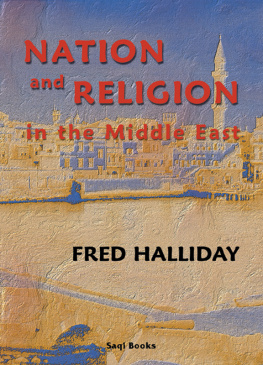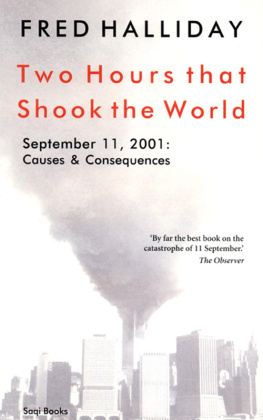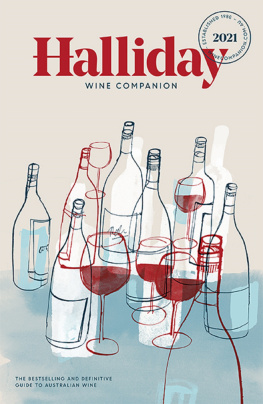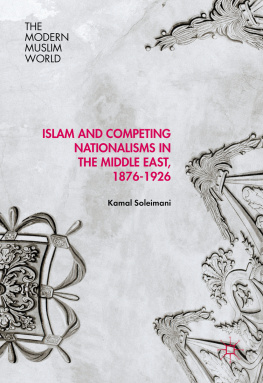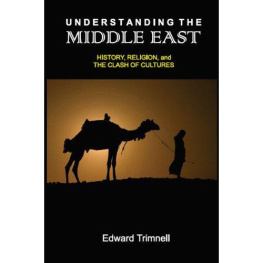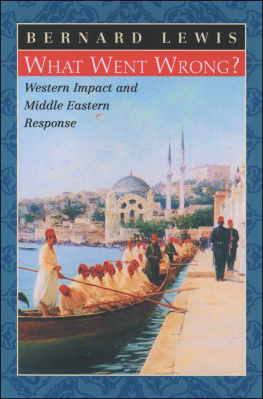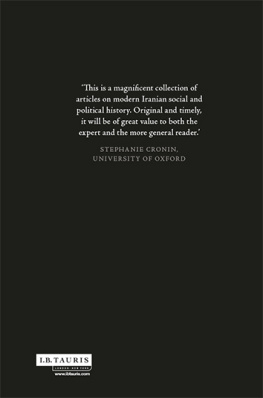Introduction
The texts included in this volume cover a range of topics and genres: some are analyses of the workings of ideology and power within the contemporary Middle East, some are engagements with particular debates that concern both the Middle East and the Western world, some address the ways in which identity has been defined and changed. I have tried in previous books to address these issues, both in regard to particular countries on which I have written, most notably Iran and Yemen, and in more general discussions of the contemporary Middle East. These essays pick up and, I hope, take further the discussion in these earlier volumes.
There are three themes in particular which I hope that these essays, in their diversity, can address. The first is that of the formation of culture be it national, or religious. Against those within the Middle East and outside who analyse the region in terms of constant cultural or religious identities, I seek to show here how what is defined as the national or religious is itself subject to change: what is presented as true, traditional, genuine is liable to differing interpretations that draw both on themes from outside the region and from variant interpretations of the past. In the analysis of religion, as much as in that of nationalism, I hold to a modernist position: the pretense of both nationalism and religion is that they represent a true reading of a given, the past or the doctrine; the reality is that different groups, in power or out of it, in the region or in exile, constantly redefine and reselect to serve contemporary purposes. What is today presented as the true representation of a past tradition is in fact a contemporary, modern creation, designed to meet contemporary needs, not least the interests of those defining the tradition. Ideology is in this sense instrumental, for those in power states, elites, classes, religious authorities, men and for those challenging power.
My second theme is the impact on the Middle East of the external context be this economic, military, political or cultural. Contemporary focus on globalization may run the risk of confining discussion of such international factors to the recent past: but the Middle East as a whole, and the variant states and peoples within it, have been influenced by the external, just as they have influenced the external world for millennia. The defining moment in the original definition of classical Greece, and hence of Europe, was the battle of Thermopylae in 480 BC, between Greek defenders and Persian invaders. Later one need only think of the impact on Europe of Christianity and Islam, both of which originated in the Middle East, or of the impact on Mediterranean countries of the Arab and Turkish Islamic empires. From the eighteenth century onwards European imperial expansion, above all that of Russia, Britain and France, was to dominate the history of the Middle East. The Middle East of today has been formed, above all, by the workings of modern capitalism.
This relation is not the expression of some timeless antagonism. In much of the twentieth century it took a specific form, conflict between colonial and anti-colonial forces. The form that states, economies, but also religious and nationalist ideologies, have taken in the modern Middle East reflects that interaction. The role that anti-imperialism took was itself two-sided serving to emancipate peoples from foreign oppression, but also in its turn serving to legitimate new forms of indigenous oppression.
Today there is much discussion of the relation between cultures: but I do not see such a relation as necessarily antagonistic or, conversely, as conducive to benign monotheistic accommodation. While the interaction between cultures is changing, variant, a reflection of political and social needs, the fact of interaction cannot be avoided: cultural autarky is, and always was, an impossibility. In the contemporary Middle East no society is immune to the international context, as the contrasted but convergent fates of Wahhabi Saudi Arabia and revolutionary Iran demonstrate: the question is how these societies react to changes in the external world, and whether they can respond creatively to them.
The third and for me most important theme that this book addresses is that of the possibility of discussion, on analytic and moral issues, between peoples and cultures. No understanding of the contemporary world, and not least that between the Middle East and the West, can fail to recognize the profound inequalities, and persistent hierarchy of power, that define these relations. That is why it is essential to recognize the continuing impact on the Middle East of the period of imperialist domination. A recognition of that past is a precondition for an understanding of the present, let alone for a resolution of the issues that divide the Middle East from the West. Contemporary, capitalist globalization accentuates the inequality, but recognition of this should not lead us to explain all developments in the Middle East in terms of imperialism. The end result of that can all too easily be conspiracy theory. Nor should a recognition of imperial domination and cultural difference, or the hierarchy inherent in globalization, lead to the denial of discussion of issues that are common to the Middle East and the West. It is possible to address issues of analysis and ethical position that are shared.
This possibility of discussion across national and cultural boundaries is true of, for example, the role in politics of nationalism and religion. This is an issue that arises in many parts of the world, including that country from which I originate, namely Ireland. I do not believe that being reared in the context of Irish nationalisms, for there are more than one, necessarily allows one to understand the rest of the world. I am wary of how many in the Middle East, both Arab and Zionist, have drawn lessons to suit their purpose from the Irish case. I do, however, think the Irish story instills both a recognition of the enduring force of nationalism, of its cultural and political importance, and an element of scepticism about the claims of nationalists, not least those who so confidently mix nationalism with religion.
I am, for these reasons, strongly against the trend, pervasive in much contemporary Western and Islamic political thinking, that seeks to deny the possibility of a common, universalist intellectual endeavour. Whether it be in regard to issues of democracy and human rights, or in regard to the claims of nationalists and fundamentalists, or in arguments about secularism, I believe there is a possibility of a shared political space: that shared space is a product of a common humanity, and common membership of a single world economic and political system produced by modernity. Indeed it is only on the basis of such an aspiration to shared, indeed universal, values that the recognition and overcoming of the international system of hierarchy, so central to globalization as it was to imperialism, can be addressed. The disputes that do divide peoples and nations are not primarily about values or civilizations. They are about interests, territory, power, and about the impact of competition for power within particular states on the international system. The earlier, contestatory universalisms of liberalism and socialism recognized this commonality of value in a world of material inequality.
No-one familiar with academic and political discussion of the contemporary Middle East can think that it will be easy to win the argument on these issues. There is too much of an accumulation of myth and half-truth, and too many people with a vested interest in propagating such myths, for them easily to be overcome. Yet it is important for the debate to be held, for those whose simplifications affect discussion in the Middle East and outside to be challenged. Here I would cite three people who, in my view, have made an exceptional contribution to this endeavour: Maxime Rodinson, the French orientalist, whose substantive work and critique of myths on the Middle East has set a model for us all; Sadeq al-Azm, the Syrian writer, who has over many years written with courage and clarity, against the tide of nationalist and religious obscurantism; and Muhammad Khatami, current president of Iran, whose writings have argued for a dialogue, not a clash, between civilizations and whose own philosophical work is an outstanding attempt to explore the implications of liberty, seen by him as a universal aspiration, with religious and cultural identity. In a world of simplification, dogmatism secular and religious and demagogy it is voices such as these which mark the possibility of a distinctive, reasoned and universalist approach.

